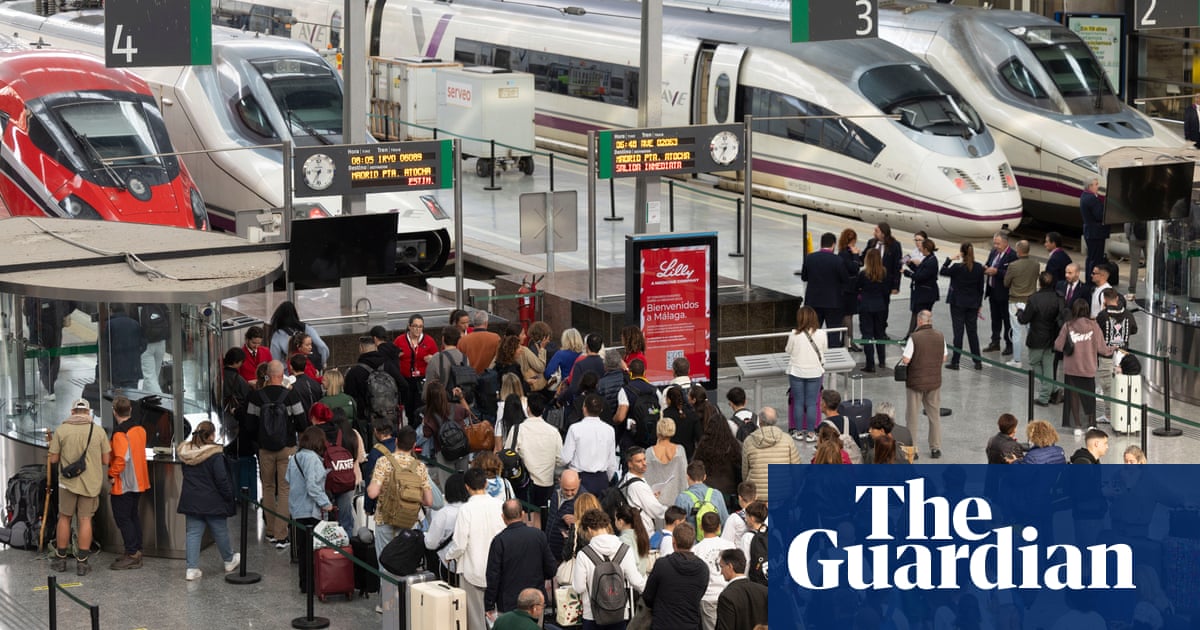Spain’s transport minister has said the country’s rail network suffered “an act of serious sabotage” after vital signalling cable was stolen over the busy bank holiday weekend, bringing severe delays to high-speed services between Madrid and Seville that affected more than 10,000 travellers.
The country’s state-owned rail operator, Renfe, said the problems on the line between the capital and the southern region of Andalucía had been caused by the theft of cable from four different locations in the Toledo area, south of Madrid, late on Sunday.
As Renfe and the railway infrastructure company Adif rushed to restore services, Spain’s transport minister, Óscar Puente, said: “We have suffered an act of serious sabotage on the high-speed line between Madrid and Seville”, adding that the Guardia Civil police force was investigating the matter and was asking anyone with information to come forward.
In a radio interview on Monday morning, Puente said the network appeared to have been deliberately targeted. “This is a low-value theft,” he told Cadena Ser. “Whoever did it knew what they were doing because there were no cameras and the financial gain is absolutely negligible compared with the enormous damage.”
The minister said he viewed the incident as “damage” rather than theft, adding that it involved 150 metres of cable.
Álvaro Fernández Heredia, the president of Renfe, said he also felt the theft was suspicious.
“It’s not great to have cable stolen from four different points and in both directions in one day,” he told the state-owned Radio Nacional de España. “It’s strange and I’m sure the transport ministry and the police will be looking into this because it isn’t something we’ve seen up until now.”
Asked if he shared Puente’s contention that it was a case of sabotage: “I do … The theft of signalling cable on which the safety infrastructure depends is sabotage, even if it’s just simple theft because it’s an attack on the infrastructure itself.”
By 9.30am on Monday, Renfe and Adif said the Madrid to Seville line was running again and hoped services would return to normal over the course of the day.
By early Monday morning, Alberto Valero and his family, visiting Spain from Mexico, had spent hours at Madrid’s Atocha station, waiting for a train to Seville.“We’re here with tourists from everywhere; France, Portugal,” Valero told the Associated Press. “Everyone is at a loss for what to do because of the total disarray.”
The severe delays came a week afterSpain and neighbouring Portugal suffered an unprecedented and as yet unexplained power blackout, prompting the opposition conservative People’s party (PP) to accuse the socialist-led government of incompetence.
“We’ve had two events in the past week that are more commonly seen in countries we wouldn’t want to resemble; countries where the government has forgotten about its citizens,” said PP sources.
The PP’s leader, Alberto Núñez Feijóo, said thousands of people had been stranded on trains overnight without water.
“This is the second Monday when we’ve had scenes that do not befit the fourth-largest eurozone economy,” he said. “People don’t deserve to be paying more taxes for worse services. Spain needs to function again and that’s my aim.”
Inan interview with El País on Sunday, Spain’s environment minister, Sara Aagesen, warned it could take days to discover the reasons for last week’s power outage. She alsoechoed her view that it was far too soon for opposition parties and others to be pointing the finger at the country’s renewable energy sourcesas a possible cause.
“Blaming renewable as a [reason for the blackout] seems irresponsible and simplistic to me,” said Aagesen. “Irresponsible because we’re talking about a resource that has been part of our energetic mix for a long time. And, besides, we’ve had very similar power generation on many previous days, with lots of renewables and even with lower demand – and the system has worked perfectly.”
